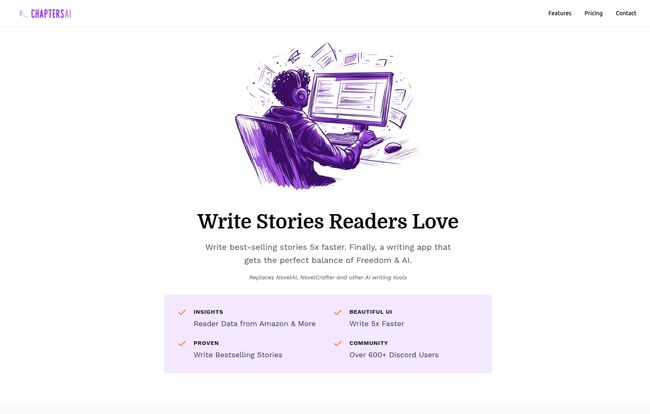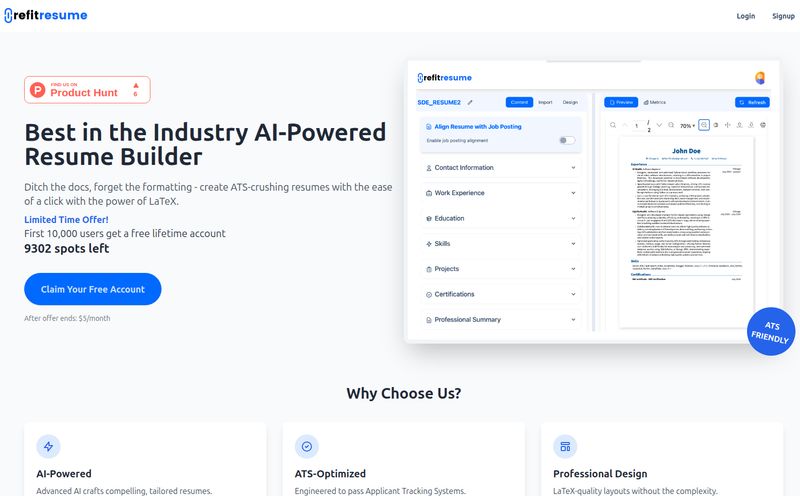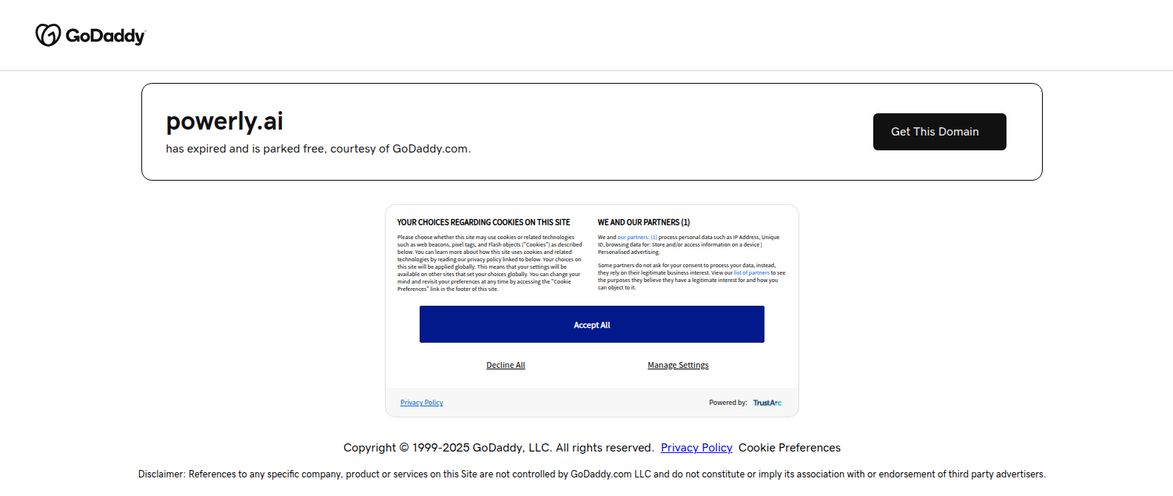As someone who's been swimming in the sea of SEO and content for years, I've seen more AI writing tools than I can count. They pop up, promise the world, and usually end up being a slightly re-skinned version of the same old thing. Most are fine for banging out a quick blog post outline or a product description. But for a real, complex project? Like a novel? Forget it. The context window snaps shut, the AI forgets character names, and the whole thing turns into a digital mess.
It's a frustration I know well. I've got Google Docs littered with comments like "[Explore this idea later?]" and old Scrivener files with so many disconnected notes they look like a conspiracy theorist's corkboard. So when I stumbled upon ChaptersAI, I was skeptical. But then I saw its core premise, and I’ll admit, my curiosity was piqued. It's not just another AI writer. It's built on a fundamentally different, and frankly, much smarter idea.
So, What Exactly is ChaptersAI?
At its heart, ChaptersAI is what the tech folks would call a "GPT client." But that's a boring way of saying it's a clever interface for using powerful AI like OpenAI's models. What makes it special is its killer feature: branching conversations.
Imagine you're writing a scene. Your hero is at a crossroads. Do they confront the villain or sneak away? With a normal AI, you'd have to pick one, or copy-paste your text into a new window to try the other path. It’s clunky. With ChaptersAI, you can just... branch it. You take that paragraph and create a whole new, separate chat that explores the "confront the villain" timeline. Then you can hop back to the original point and create another branch for the "sneak away" option.

Visit ChaptersAI
It’s like creating a Choose Your Own Adventure book for your own writing process. Every single paragraph can be its own starting point for a new rabbit hole of ideas, all without losing your original thread. Suddenly, you're not just writing a linear story; you're building a story-tree, a whole universe of possibilities. And getting back to your main trunk? A single click.
Why Branching Is a Writer's New Best Friend
This isn't just a neat gimmick. I’ve always felt the creative process is anything but linear. This tool actually gets that.
Chasing Plot Bunnies Guilt-Free
We all have them. Those little “what if” ideas that pop into your head. What if the sidekick was secretly the traitor? What if this fantasy world had trains? Usually, exploring these means derailing your momentum. With ChaptersAI, you just create a branch, riff with the AI for a few thousand words, and see if the idea has legs. If it doesn't, no big deal. You just prune the branch. Your main manuscript remains clean and untouched.
Deep Dives into World-Building and Backstory
I was working on a scene and needed to figure out the history of a specific magical artifact. Instead of opening a new document, I branched off the paragraph where it was mentioned. I used the new chat to generate lore, historical timelines, and previous owners. Once I had what I needed, I popped back to my main draft, armed with all this new depth. The best part? All that world-building is still there, neatly tucked away in its own branch, ready to be referenced later.
Version Control for Creatives
Developers have had tools like Git for ages to manage different versions of their code. Writers have had... "Save As > MyNovel_v2_final_FINAL.docx". It's a nightmare. ChaptersAI brings a similar, more intuitive idea to writing. Each branch is essentially a different version. You can experiment wildly, and if you prefer an earlier direction, it's right there. You never lose a good idea just because you tried a new one.
Beyond Branching: The Features That Actually Matter
While the branching is the headline act, a few other things stood out to me.
First, privacy. The project data is stored locally in your browser. This is HUGE. For any author who's paranoid about their masterpiece-in-progress floating around on some company's server, this is a massive sigh of relief. What you write stays on your machine. Simple as that.
Second, you can edit the System Message. This is a bit of a power-user feature, but it’s fantastic. It means you can give the AI overarching instructions for the entire project, like setting a specific tone, defining a character's voice, or reminding it of key world rules. It’s like giving your AI co-writer a project bible to follow.
And third, the website mentions pulling Insights from Amazon reader data. This is an interesting one. While the core GPT client is one thing, the full-fledged author platform seems geared towards helping you write stories that sell, which is a pretty bold and useful promise if they can deliver on it.
My Honest Take: The Good and The Not-So-Good
No tool is perfect, right? Here’s my breakdown after playing around with it.
The Good Stuff
The freedom is incredible. It genuinely changed how I approach brainstorming within a draft. The ability to just follow a spark of an idea without consequence feels liberating. It’s less of a ghostwriter and more of a tireless, perfectly organized brainstorming partner. It’s built for complex projects, and it shows. The UI is clean, and the concept is just so... smart.
The Caveats
Because it stores data locally, you can run into your browser's storage limits, which is apparently around 5MB. For a truly epic novel with hundreds of branches, this could become an issue. It’s a technical trade-off for the privacy you get. Also, this isn't a free-for-all. There's a subscription, and some models might require you to plug in your own OpenAI API key, meaning you're billed separately by OpenAI for your usage. This is pretty standard for advanced clients, but it's something to be aware of.
Let's Talk Money: The ChaptersAI Pricing Plan
This is where things get interesting. Based on their site, the main offer is aimed squarely at authors. Here's what it looks like:
| Plan Name | Price | Trial Offer ||---------------|--------------------------------------|----------------------------------|| ChaptersAI | $49 / year (listed as down from $99/year) | One-month free trial |
Frankly, for a specialized writing tool, $49 a year is a pretty competitive price, especially when you compare it to other premium writing software. The one-month free trial is generous and gives you plenty of time to see if the workflow clicks for you. I have seen some mentions of a $9/mo plus API usage model, which might be an alternative or apply to a more generic version of the client. But for the story-writing app shown on their homepage, the annual plan seems to be the main deal. For the most current info, I'd check their pricing page directly.
Who Is This For? (And Who Should Pass?)
I think ChaptersAI is a dream come true for a specific type of creator. If you're a novelist, a screenwriter, a playwright, or even a Dungeon Master building a complex TTRPG campaign, this tool could seriously streamline your process. Anyone working on a long-form, non-linear project where ideas spiral and interconnect will find a lot to love here.
Who should skip it? If you're a blogger, marketer, or student just looking for a tool to summarize articles or write short-form content, this is probably overkill. It’s a specialized instrument, not a swiss army knife.
Frequently Asked Questions about ChaptersAI
1. What is ChaptersAI in simple terms?
It's an AI writing application that lets you branch off any paragraph into a new, separate chat. This helps you explore different plot points, character ideas, or world-building details without messing up your main document. It's designed for large, creative writing projects like novels.
2. Is my writing private and secure?
Yes. A key feature of ChaptersAI is that it stores your project data locally in your computer's browser, not on their servers. This means you maintain control and privacy over your work.
3. How much does ChaptersAI cost?
The main plan advertised on their website is $49 per year. They offer a one-month free trial so you can test it out thoroughly before committing.
4. Do I need my own OpenAI API key?
Some advanced GPT clients require this, and the technical data suggests this might be an option. This means that on top of the subscription, you'd pay OpenAI directly for the amount of text you generate. However, for their primary author-focused plan, this might be included. It's best to clarify during the trial period.
5. Can I use it for something other than writing a novel?
Absolutely. It's perfect for any complex writing. Think screenplays, detailed technical reports, academic theses, or even planning an elaborate Dungeons & Dragons campaign. If your project benefits from exploring multiple threads of thought, ChaptersAI will be useful.
Final Thoughts: Is ChaptersAI Worth It?
I'm genuinely impressed. In a market saturated with generic AI wrappers, ChaptersAI feels like a tool built by people who actually understand the messy, beautiful, chaotic process of creating something from nothing. It doesn’t try to write the story for you; it gives you a better canvas to paint on. It respects the non-linear nature of creativity.
For the serious world-builder or novelist, that $49/year price tag could be one of the best investments you make in your writing process all year. It won’t magically cure writer’s block, but it might just be the perfect partner to help you navigate it.



